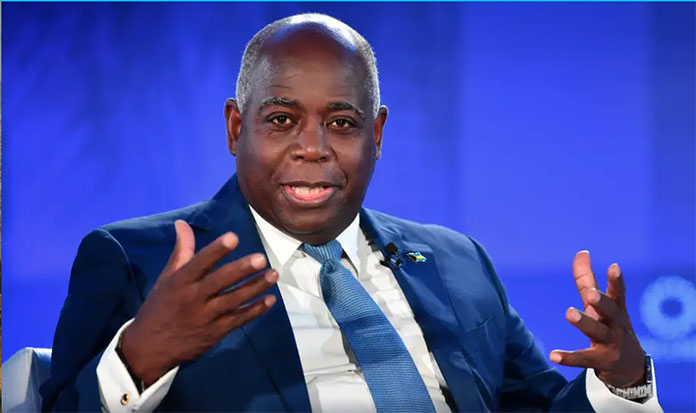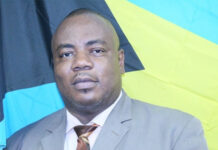
Friends,
By the time I finish speaking, a new technological advancement will be made. By the time I take my seat and the next speaker begins, another will follow.
This is the rhythm of the age we live in — an age defined by rapid innovation, constant acceleration, and the rise of technologies that now shape every aspect of our economies, our institutions, and our lives.
But while the digital revolution promises so much, it also lays bare the deep disparities between what is possible and what is currently real for too many of our citizens.
Across the Caribbean, there are still children who cannot access reliable internet to complete a school assignment. There are small businesses shut out of global markets because the infrastructure simply doesn’t exist. There are civil servants expected to deliver 21st-century services with 20th-century tools.
And if we are being honest with ourselves — if we are truly committed to the people we serve — we must admit that while the world is building faster, smarter, and more connected systems, we are still moving too slowly, too unevenly, too cautiously.
We are living through one of the most profound shifts in human history. Artificial intelligence, quantum computing, blockchain — these are not distant possibilities.
They are shaping global markets now, influencing public life now, redefining power now.
And yet, at the same time, many of our nations are still grappling with the basics: ensuring rural communities have access to broadband, that schools have devices, and that citizens can interact with their governments without having to take a day off work.
This is not just a matter of development — it is a matter of justice.
Because when access to digital systems determines access to opportunity, exclusion is no longer just economic. It becomes structural. It becomes generational. It becomes a quiet, creeping injustice—robbing people of the right to fully participate in modern life.
But, friends, this is not a story of defeat.
There is another side to this story. A story of what is possible when political will meets practical action.
And here, The Bahamas has proven that leadership in the digital space does not depend on size, but on vision and courage.
We became the first nation in the world to launch a central bank digital currency, the Sand Dollar, not as a symbolic gesture, but as a practical solution to a real problem: how do we ensure that people across a scattered archipelago of 700 islands can access safe, efficient, and modern financial services?
We followed that bold move with the passage of the DARE Act—one of the world’s earliest and clearest attempts to regulate the digital asset space responsibly. In doing so, we rejected the view that small states must wait on global consensus before acting.
We proved that we can lead on our own terms, for our own people.
This is what effective digital policy looks like: action rooted in equity, grounded in law, and aimed at building real opportunity.
But isolated success is not enough.
Because if some countries lead while others lag, we do not become a region of progress—we become a region divided. And in a world as interconnected as ours, no nation can afford to advance alone.
We are therefore called, not just to lead individually, but to act collectively. To build systems that are interoperable, secure, and inclusive.
To invest not only in platforms, but in people. In the teachers who will train the coders,
In the regulators who will govern the platforms,
and in the young people whose ideas will power the next wave of innovation.
And we must also be clear-eyed about the dangers.
We must also be clear: this is not simply about platforms or data storage—it is about security, sovereignty, and stability.
Cybercrime is not a future threat. It is a present one.
Misinformation, data exploitation, and digital surveillance are eroding trust and weakening democratic institutions.
Our electoral systems are vulnerable. Our public databases are exposed. Our citizens are being targeted—not with bombs or bullets—but with falsehoods, with manipulation, with breaches of privacy that go unseen but cut deep.
This is the nature of modern conflict—quiet, digital, and relentless.
And if we do not build the legal, institutional, and technical frameworks to confront these threats now, then we will lose control of the very systems we depend on to function as sovereign nations.
Digital colonization is not just about who owns the infrastructure. It is about who decides what is true. Who has access to power. Who profits from our participation. And who shapes the rules of this century’s economy.
If we do not secure our digital future, someone else will define it for us.
So the question before us is not whether the world is changing. It is whether we are willing to change with it — and whether we are prepared to do so with the urgency, seriousness, and moral clarity this moment demands.
We must act not simply because the technology exists, but because justice requires it.
Because no child should be left behind due to a lack of signal.
No business should be locked out of opportunity because of where it is located.
And no country, no matter how small, should be told that it cannot shape its own digital destiny.
This is the time for resolve. For responsibility. And above all, for leadership rooted in service to the people we are elected to serve.
We can choose to be a region that is ahead, or we can continue, year after year, to fall behind.
There is no middle ground.
The pace of global change is too fast. The stakes are too high.
The costs of inaction are no longer theoretical. They are visible, measurable, and already being borne by the most vulnerable in our societies.
To be ahead means investing – seriously – in our digital infrastructure, in training teachers not just to teach literacy and numeracy, but to prepare students for the economies of tomorrow.
To be ahead means ensuring our young people have access not just to devices, but to the education, mentorship, and capital needed to become creators — not just consumers — in the digital world.
To be ahead means building regional resilience — not as a talking point, but as a common framework for cybersecurity, data protection, and cloud infrastructure that secures our sovereignty in a world where power is shifting from the physical to the digital.
But to be ahead also means having the courage to confront the uncomfortable.
Why are some of our best minds still forced to leave the region to find opportunity?
Why are Caribbean innovators still struggling to access funding when the world is awash in capital for digital transformation?
Why do we spend more time adopting external platforms than building our own?
If we want to lead, we cannot simply copy models from abroad. We must build systems that reflect our values, our realities, and our aspirations.
We must stop asking: “Is the Caribbean ready?” and instead ask: “What is required of us to lead?”
Because readiness is not a matter of capacity — it is a matter of will.
There are small nations around the world, with fewer resources than ours, that have chosen to be laboratories for innovation, because they understood that leadership is not about size, it’s about seriousness.
We can be among them.
We must be among them.
The alternative — drifting further into digital dependence, watching our economic margins erode, our young talent disengage, our public services falter — is not just unacceptable. It is avoidable.
But only if we act now, and act together.
Let this not be another moment where we admire the challenge but shrink from the responsibility.
Let this be the moment we say: the Caribbean will lead — not by default, but by design.
Not because we had more, but because we chose to do more with what we had.
Friends,
There was a time in our history when foreign powers came to our shores, claimed our resources, dictated our rules, and extracted our wealth — all without consent, and often without resistance.
We called it colonization.
We were taught, after Independence, that such times had passed. That sovereignty had been won. That we would now govern ourselves, build for ourselves, and protect the interests of our people.
But what if I told you that a new form of colonization is quietly underway?
One without gunboats, without governors — but no less powerful, no less dangerous.
Digital colonization.
And it is happening right now.
We use foreign platforms to communicate with our citizens.
We store national data on servers located outside our legal jurisdiction.
We adopt financial technologies we cannot regulate, and rely on infrastructure we do not control.
We call it progress. But in truth, it comes at a cost: the slow erosion of our authority, our self-determination, our agency.
And I echo the concerns of Prime Minister Mia Mottley, who warned the world that the developing nations are becoming digital dependents — connected, yes — but increasingly captive to systems that are built elsewhere, governed elsewhere, and extract value without accountability.
We must not pretend this is accidental. It is systemic.
Today, our students learn from educational apps that track their behaviour without local oversight.
Our health data is managed through systems vulnerable to foreign interference.
Our elections are influenced by content delivered through algorithms we neither understand nor control.
This is not partnership. This is dependence.
And dependence of this kind — unquestioned, unregulated, and unbalanced — is how colonization begins again.
Except this time, it arrives not with flags, but with terms of service.
Not with armies, but with data centers.
Not with declarations, but with contracts no one reads and platforms no one owns.
We have a name for this: silent surrender.
And I ask — what are we surrendering?
We are surrendering the ability to govern. To protect. To shape our future on our own terms.
Because when decisions that affect our people are made by distant companies, enforced by private algorithms, and adjudicated in foreign courts, we are no longer sovereign.
We are digital tenants in a house we do not own.
This must not stand.
Just as we reclaimed our political independence in the last century, we must now assert our digital independence in this one.
This means investing in regional infrastructure, so our data is stored under our laws.
It means regulating foreign digital actors, not to push them out, but to ensure they respect our people, our laws, and our values.
It means building our own platforms — so that we are not always the last to know, the last to benefit, the last to matter.
And it means uniting as a region, not to complain, but to coordinate. To create a common framework for digital sovereignty that gives the Caribbean a collective voice strong enough to demand respect in the global digital order.
Friends, this is not a matter of pride. It is a matter of protection.
Because if we do not defend our digital space now, we will soon find it too compromised to recover.
The Caribbean has known colonization before. And we have known the long, hard road to freedom.
Let us not walk that road backward, in silence, through code.
Let us instead rise — clear-eyed, united, determined — to ensure that no power, no platform, and no private interest undermines the sovereign dignity of our nations again.
Friends,
The greatest disservice we could ever do to the people of the Caribbean, especially to our young people, is to fail to prepare them to meet this moment.
That would be our great failure.
To offer them promises, but not pathways. To inspire ambition, but not invest in the tools they need to realise it.
We cannot afford that failure. Not now. Not when the moment demands more.
Because our young people are not simply users of technology. They are inventors, designers, and problem-solvers. They are full of the ideas and drive that can transform this region, not over decades, but now.
But talent without opportunity is a tragedy.
And so the question is: will we equip them with what they need to lead?
Will we build the regional training centres?
Will we reform our school systems to teach not just digital literacy, but digital confidence?
Will we invest in the kinds of broadband infrastructure and affordable access that allow a young woman in Long Island or Saint Vincent to compete with anyone, anywhere in the world?
And will we create a space — intellectual, economic, and political — where their ideas are heard, nurtured, and funded?
That is where CANTO comes in.
This organization is more than a convenor. It can be a catalyst.
CANTO has the capacity to build the bridges — between governments and industry, between education and innovation, between today’s challenges and tomorrow’s opportunities.
And I urge you: do not underestimate the role you can play in rewriting this region’s future.
You can set the standard for infrastructure, for equity, for innovation.
You can help create the ecosystem in which our youth do not have to leave to thrive — but stay, and build.
And together, we can make this region not just a participant in the digital world, but a pioneer.
Friends,
The Bahamas has, time and again, played an outsized role in shaping history.
It was right here in Nassau, nearly four decades ago, that the Commonwealth gathered to take a principled stand against apartheid. From that meeting came the Nassau Accord, one of the most decisive steps toward the release of Nelson Mandela.
We were a small nation hosting a global gathering. But we showed what can happen when conviction meets courage, when leaders come together not just to talk, but to act.
So let us not underestimate what is possible when thinkers, builders, and believers gather with a shared sense of purpose.
Today, we face a new struggle — not one of political imprisonment, but of digital captivity. The question before us is whether we will own our future, or simply rent space in someone else’s.
That is why I invite you to support Stephen Bereaux as the Caribbean’s candidate for Deputy Secretary-General of the International Telecommunication Union.
Stephen is not just a brilliant regulator or a skilled negotiator — he is a Caribbean son with global vision. He understands what it means to navigate the complexities of small island states in a rapidly digitizing world. He brings the competence, the character, and the clarity of purpose to ensure that our region is not only heard, but taken seriously.
Backing Stephen is not merely about representation. It is about responsibility.
Because when we place Caribbean leadership in global institutions, we are not just elevating an individual — we are advancing the values, needs, and ambitions of 44 million people across our region.
We are saying that the Caribbean will no longer wait for inclusion. We will lead the way in shaping fairer rules, stronger protections, and a future that works for us all.
And as we reflect on the progress made and the work ahead, let us take a moment to honour a remarkable milestone:
CANTO at 40.
Forty years of convening. Forty years of connecting. Forty years of helping our region move forward.
You have built an institution that has stood the test of time, not by staying still, but by staying relevant. And now, as we enter a new digital era, your mission has never been more urgent.
CANTO, you have the capacity to do what politics alone could not: to unite our islands around common digital standards, common investments, and a shared future.
And so, as you mark your 40th year, let this not only be a celebration of the past, but a recommitment to the future.
Let this be the moment we say: the Caribbean will not drift into the digital world. We will drive it.
We will protect our data.
We will empower our youth.
We will invest in our people.
And we will lead — not one day, but today.
And when we gather again for your 41st Anniversary celebration next year, let us not just raise our glasses.
Let us raise our standards.
Because the future belongs to those who shape it.
Congratulations, CANTO.
May your next forty years be even bolder, even more united, and even more committed to the region we all work for and serve.
May the work we begin here echo across every island, every community, and every generation still to come.
Thank you.







